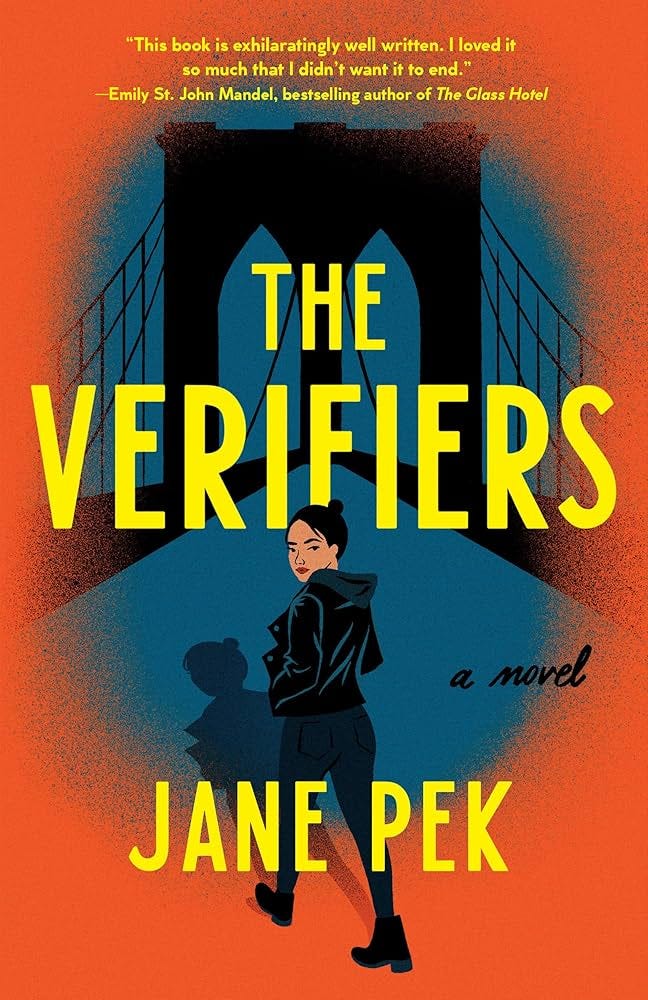Jane Pek, The Verifiers (New York: Vintage, 2022)
Who makes us who we are? What say do we have in it?
Jane Pek’s excellent debut follows the adventures of a self-deprecating amateur sleuth, Claudia Lin. I can only hope that her name is a sly nod to the Babysitters’ Club Claudia Kishi, not to mention the brilliant tween punk anthem from a few years ago mocking what she represents – the beautiful, mildly exotic Asian sidekick. Anyway, Claudia Lin is no sidekick. Armed only with a love of classic detective fiction and a refusal to take the easy way out, she finds herself embroiled in a web of deceit, shady corporations, and, of course, murder.
As regular readers will know, one of the things I struggle with in detective fiction is the police. Pek finds an ingenious solution: Claudia works for a specialty investigation agency, named Veracity. Their field is online dating: they vet the people you’ve matched with or met online, checking out what’s true in their profiles and what’s pure fiction. Claudia is the newest employee, giving the reader the chance to be introduced the world of online dating and its evolving algorithms over her shoulder.
Soon, however, she’s using the company’s tools to investigate a case on her own time. Why did Iris Lettriste seek their services and then vanish? What secrets does she hold? And why doesn’t Claudia’s boss want her looking too deep?
Like my favourite k-dramas, The Verifiers plunges us fully into Claudia’s world. We meet her family, immigrants to Queens, and we come to understand why her beautiful sister and her highly-successful brother are so insecure when it comes to bumbling, low-earning littlest-sister Claudia. Pek invents a whole series of Chinese detective novels just for fun, to give Claudia a role model. We coast through the awkward parties and chit-chat of IRL nerdy-queer dating. It’s so perfectly observed that I sort of wanted Pek to hit pause on the mystery story and give us a long queer realist novel instead. I’m still laughing about the grad-student Halloween party that Claudia attends at one point.
We’re let into the apartment by a guy wearing a crown and carrying a length of rubber hose attached to a nozzle. When we ask he tells us he’s a noble gas, which gives me some idea of what this party is going to be like. (117)
But this is a mystery novel! And one with a bigger point to make. Claudia is the product of her family. She’s also the product of her mystery-novel obsession, and her friendships, and her relationships with her co-workers. Like all of us, she’s always a work-in-progress, a dialogue between her inner world and the universe around her – to make a distinction that I’m not sure is all that clear in real life.
Through the means of online dating, Pek asks us to consider: to what extent are we also the product of the lies we read and the spin we’re fed? What if algorithms aren’t only designed to identify our desires, but to produce them? What if the ‘people’ who are form are universe sometimes aren’t people at all, but computer-produced hallucinations designed to alter our real-life actions?
As a historian, I’m interested in the different ways people have understood the boundaries between self and other, between inside and outside, and human and non-human. I’m especially interested in how we’ve tried to create forms of community that change and shape over very selves. In a moment saturated with conversations about AI, Pek’s novel offers a useful reorientation, turning our attention back to human relationships as well as the capacity of technology to manipulate and distort them.
I suspect that some of the characters in Pek’s novel, like many proponents of big tech, think that human individuals are, or should be, self-contained and autonomous. Think rugged individualism. If you take that view, manipulation is a surface issue, and anyway a problem more for the weak than the strong. But what if you recognise the precarity of human individuality? What if you accept that we are more composite than individual, formed of billions of microorganisms and constantly remade by context and community? Then the problems of algorithms become just the latest variation in the problem of how to live together.
I bought The Verifiers from the charming Portal Bookshop in York. The copy I bought was a US edition. So the book’s presence in the UK is its own mystery, perhaps involving a portal between York and New York?? – but I know at least one person has successfully borrowed it from a UK library, so I hope you can find a copy if you want one! You can find out more about the book here.




